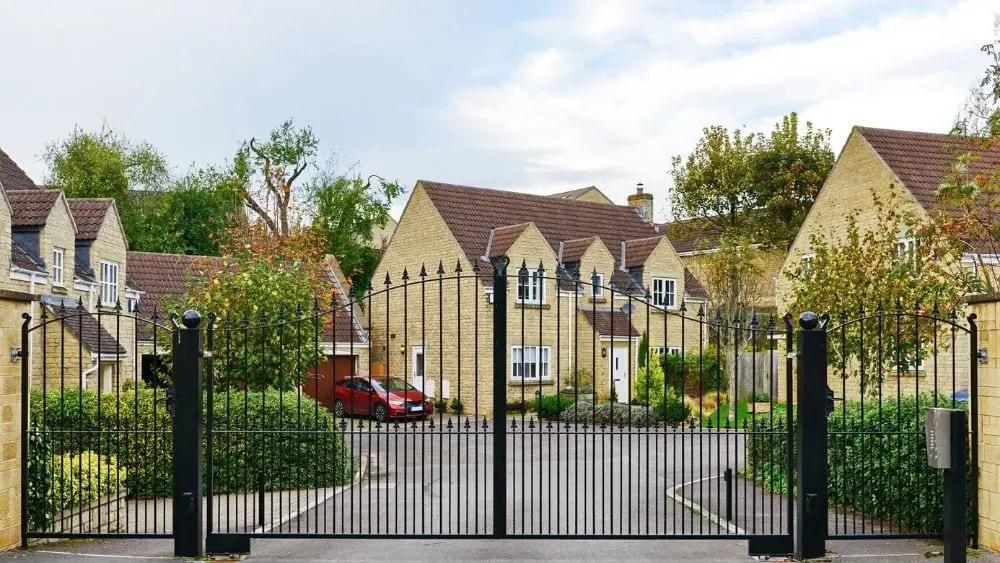
In the movies, it can appear like only the rich and famous live in a gated communities. Fortunately, in reality, it’s a life not reserved just for them. Though, living behind a gate can be both rewarding and frustrating.
Before deciding to buy a new home in a gated community, consider these pros and cons when weighing your options.
Pros of a Gated Community
Enhanced Security
This may be the biggest reason families choose to choose to live in a gated community. Gated communities have various levels of privacy; some have a 24/7 guard at the gate, others have a code to punch in at the gate.
The added security is a major plus if you go out of town a lot, says Alison Bernstein of Suburban Jungle, a real estate relocation firm that specializes in moving individuals from urban to suburban environments.
“It’s as if you have your own ‘doorman’ of sorts. [Security] can serve as an extra hand if need be,” Berstein said, “whether to collect mail deliveries or dry cleaning, and/or aid with packages and other necessities.”
A gated community is more difficult to enter, thus you’re less likely to have unwanted visitors, whether it be criminal activity or solicitors.
“The vast majority of cars and people inside your gates will be residents, a few visitors, and very few service or delivery providers,” said Tony Bai, a real estate agent with Keller Williams Realty in Irvine, CA. “You will not get many, if any, solicitors other than your neighbors’ kids selling stuff for school fundraisers.”
Lack of Traffic
Restricted access means less traffic. Gated neighborhoods are perfect for families seeking quieter streets. People won’t be able to cut through your neighborhood to bypass rush hour traffic. Families may also feel more comfortable having their kids play in the front yard when there aren’t cars passing by constantly.
Consistent Upkeep
Gated neighborhoods have a more uniform design, with rules usually set by the homeowners association or HOA, that keep yards looking manicured and streets and sidewalks free of potholes.
Gated communities also help set standards to ensure all neighbors are properly maintaining their homes and grounds, as well as maintain a consistent look and feel of the community by regulating exterior paint colors, roof colors, doors and windows.
In fact, some gated communities will pay monthly dues to the association to handle landscaping, road maintenance, private garbage collections, snow removal, and other tasks.
While uniformity is a positive for some homebuyers, others may disagree and want more creative freedom.
Cons of a Gated Community
Rules, Rules, Rules
Some homeowners don’t like extensive control over the choices they make regarding their property, but unfortunately, living in a gated neighborhood comes with an HOA that wants to make sure things run smoothly for everyone else in the community. This means rules, and for some neighborhoods, this means a lot of rules.
For example, if you want to make a particular aesthetic enhancement to your home, perhaps a funky door or a solar paneled roof, you might not receive approval. Additionally, in the event that the neighborhood association decides they want to redo the community pool or renovate the siding on all the townhomes, you will likely be responsible to pay your part.
Parking and Visitor Woes
It can be a real pain to invite people over or have social gatherings when you live in a gated community. Most neighborhoods have parking restrictions, such as no parking on the streets after a certain time, and even threaten to tow if you or your visitors park there. Even with a rule against street parking, some gated communities’ visitor parking can be seldom. This can limit the amount of guests you can have over at once.
Amenities Can Actually Lower Property Value
Homes in gated communities are more expensive for various reasons. According to a study conducted by the American Real Estate Society, or ARES, homes in gated communities are about $30,000 more expensive than a non-gated community home. This study also showed additional amenities —clubhouses, swimming pools, parks — actually bring down the property value. Mark Sunderman, Ph.D. of the University of Memphis says the additional maintenance cost of maintaining these amenities may outweigh their benefits.
Gated or Not Gated?
When thinking about your new home, think about the new community that will come with it. This is the most important factor to consider when looking at homes in various neighborhoods, whether they are gated or not gated.
For some, the benefits of a gated community will outweigh the negatives, and for others, it will seem like a no-brainer a gated neighborhood is not right for them. It all depends on you and your family’s priorities.
 Guest Quarters: Is a Guest House or Casita Right for You?
Guest Quarters: Is a Guest House or Casita Right for You?